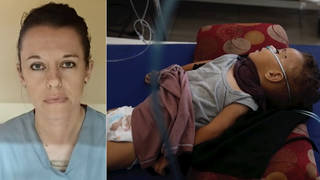
Guests
- Brenda Elseyco-director of the Latin American and Caribbean Studies program at Hofstra University and co-host of the feminist sports podcast Burn It All Down.
Spain’s national prosecutor has announced a criminal investigation into Luis Rubiales, the head of Spain’s soccer federation, after he forcibly kissed Spanish soccer star Jenni Hermoso during the recent World Cup trophy ceremony. Hermoso filed a sexual assault complaint against Rubiales, who has been temporarily suspended by soccer’s international governing body FIFA but has refused to step down voluntarily. No permanent sanctions have been announced. Meanwhile, the rest of the Spanish women’s soccer league is on strike over pay and working conditions after talks between federation leadership and the players’ union broke down. We look at what has become a #MeToo moment in Spanish sports with Brenda Elsey, co-host of the feminist sports podcast Burn It All Down, who says institutional change is desperately needed in the male-dominated world of soccer. “If they had listened to women for the last eight years, to the players, this wouldn’t have had to happen, but they absolutely refused to make any changes,” Elsey says of FIFA, noting that widespread support for Hermoso is bringing to light a “spectrum” of abuse and exploitation in the sport.
Transcript
AMY GOODMAN: Spanish state prosecutors have just filed a complaint against the head of Spain’s soccer federation, Luis Rubiales, for sexual assault and coercion, after he forcibly kissed Spanish soccer star Jenni Hermoso during the award ceremony last month after the Spanish soccer team won the Women’s World Cup. Earlier this week, Jenni Hermoso filed a sexual assault criminal complaint against Rubiales, who has been temporarily suspended by FIFA. So far, Rubiales has rejected calls to resign. Protesters across Spain have taken to the streets to support Hermoso.
ROSA SAN SEGUNDO: [translated] This is a crime. This is clearly sexual harassment under Spanish law. And not only under Spanish law, but also under European law, the Istanbul Convention, signed by Europe in 2011 and ratified by Spain in 2014, considers this as sexual abuse, and it is a crime.
AMY GOODMAN: On Tuesday, the Spanish soccer federation appointed Montse Tomé to become the first woman to serve as coach of the women’s national soccer team. The announcement was made shortly after the federation fired coach Jorge Vilda, who had long faced criticism for his coaching style. Calls for Vilda’s resignation grew after he expressed support for Rubiales. Spanish soccer player Verónica Boquete said it has become a #MeToo moment for the Spanish sports.
VERÓNICA BOQUETE: I think it’s really similar to the #MeToo moment. I really think that it’s going to help to the change, because the change is already there. It was already before this World Cup and this incident. We are in a moment of a changing, and I think that this can push us as a society a little further and a little faster.
AMY GOODMAN: Amid this growing scandal, women soccer players in Spain have gone on strike in a dispute over pay, as calls grow for the head of Spain’s soccer federation to resign — again, this in the midst of the sexual assault scandal. The strike began after talks broke down between the Spanish women’s soccer league and the players’ union over pay and working conditions. According to the union, the minimum pay for women soccer players in Spain is about $17,000 a year, compared to about $192,000 a year for male players. This is Dafne Fernández of the players’ union.
DAFNE FERNÁNDEZ: [translated] We have now finished the meeting, and the league has not offered a minimum that compensates the recognition that our players deserve. Therefore, there is no agreement, and the strike is still on.
AMY GOODMAN: We’re also now joined by Brenda Elsey, a co-host of the feminist sportscast Burn It All Down and co-author of Futbolera: Women, Sports, and Sexuality in Latin America and editor of the book Football and the Boundaries of History. She’s also a professor at Hofstra University.
Welcome back to Democracy Now!, Brenda. It’s great to have you with us. Let’s start with the absolute top news that was breaking as we went to air, that Spanish state prosecutors have accused Luis Rubiales of sexual assault and coercion for kissing a player on the lips without her consent at the World Cup victory ceremony. So, he is now, apparently, going to be criminally charged, after Jenni Hermoso filed a criminal complaint against him. But the world saw what he did. Can you talk about the significance of this moment in Spain and around the world?
BRENDA ELSEY: I can’t think of a moment more significant, really, in my lifetime. This has been incredible, and I’m really truly sorry that this has happened to such a wonderful player. Jenni Hermoso is a pillar of the women’s football community and game. However, I am also very heartened by how much attention. This story just won’t go away. And that’s because it’s part of this — as Verónica Boquete said in the earlier part of your segment, it’s part of a huge problem that people have known, that they’ve been working on, and it’s crystalized in this moment. And as much as the Spanish federation wants to say, “We did not see what we saw,” we saw what we saw.
AMY GOODMAN: Now, talk about the significance of, well, everything right now. You have the first woman to coach the women’s soccer team. She had actually quit the team. She had been on the coaching staff, but she quit among a group of other people on the women’s soccer staff over Coach Vilda and demanding a complete change in coaching, and now she has been brought back to lead the team.
BRENDA ELSEY: It’s incredibly significant, and I think it shows two really important and exciting changes and progress. And one is the organization of women athletes as workers. The labor union has been huge and key in continuing to press this issue with the federation, and so that has been incredibly important.
And the other aspect to this, of course, is that, look, I mean, the Spanish federation wants to make sure that no structural changes really happen. And so, this coaching is important. It’s an important change. Everyone knew it had to happen. But they really need to have an institutional shakeup, not only in the Spanish federation, but in FIFA. And we know this. So, I think it’s important to remember that, you know, it’s not insignificant that you change a coach. It is very important. But at the same time, there needs to be independent governing bodies within global football that can respond to these, like, widespread harassment, not only of women, but also of youth players.
AMY GOODMAN: Spain’s acting minister of culture and sport, Miquel Iceta, has voiced his support for Jenni Hermoso’s criminal complaint against Rubiales. Last week, Iceta also called — backed calls for gender equity and more women leadership in Spain’s soccer federation, saying the shift in culture would be enforced under a new sporting law in Spain.
MIQUEL ICETA: [translated] It’s over. No more discrimination for women. No more obstacles for women in sport. It’s over. It’s over. And unfortunately, that happened because of an incident that should not have taken place. We are witnessing a real social and sporting backlash, which will make this a better country.
AMY GOODMAN: And this is Spain’s Prime Minister Pedro Sánchez. He’s acting now.
PRIME MINISTER PEDRO SÁNCHEZ: [translated] It is true that there has been some behavior — in this case, that of Mr. Rubiales — which shows that in our country there is still a long way to go in terms of equality and respect and the equalization of rights between women and men.
AMY GOODMAN: So, this is very interesting. Even the prime minister cannot have him fired. And this has been the issue. I mean, they fired the coach, who supported Rubiales, though he had so many other issues, but they couldn’t get rid of Rubiales. And another fascinating aspect of this is that in Spain, across the political spectrum, something like three-quarters of the population is demanding his ouster. And let me just say, in this latest news of him being criminally charged, he faces something like one to four years in jail and a fine?
BRENDA ELSEY: Mm-hmm, yeah. I mean, there’s layers a bureaucracy here in terms of where this football governance lies. And I would say it’s labyrinthine on purpose: the idea that, you know, the more confusing it is, the less accountable people can be. And so, it is going to take efforts by people outside of football to hold him accountable. And that has happened also in places like Argentina, where they also went to the Ministry of Gender, and the criminal courts in Colombia, where the women minors on the U.S. — or, I’m sorry, on the Colombia women’s national team went to criminal court over a sexual assault within the federation. So, this has happened again and again. They have to go outside of the structures.
Rubiales cannot represent the Spanish federation at this point. He is suspended by FIFA. But it will need to take the course of the investigation, according to FIFA. You could shrug your shoulders, but if anyone paid attention since 2015, it is — FIFA has found a way to avoid responsibility in many cases, both of corruption, embezzlement, and also in terms of gender discrimination. So, those things are tied together, I think.
AMY GOODMAN: I mean, if you can talk about the federation first going after Jenni Hermoso, even threatening to sue her, accusing her of lying and defamation, now the federation attempting to distance itself as, you know, he is about to be criminally charged?
BRENDA ELSEY: It is just shocking. They are morally bankrupt. They have been for a long time. If they had listened to women, you know, for the last eight years, to the players, this wouldn’t have had to happen, but they absolutely refused to make any changes. And this is what has happened.
The fact that they have patterns of abusive and bullying and, you know, absolute — there’s such patterns of abuse that you can see, whether it’s “she said/he said,” whether it’s “You didn’t see what you thought you saw,” all of this defaming her character. This is classic behavior of predators beyond sport. And so, we can see this all play out. And it happens every day to people, and we don’t see it. But football gave us this window onto how abusers behave.
AMY GOODMAN: And if you can talk further about the level of abuse against women soccer players, and even just talking about what we’re seeing now? Instead of them being in a stadium of tens of thousands being celebrated, the women soccer players have chosen not to play, to go on strike, because their minimum pay is $17,000 a year, compared to male soccer players in Spain minimum pay is something like $192,000 a year. The women are the soccer stars. They just won the World Cup.
BRENDA ELSEY: And I hate to tell you, but that’s probably one of the highest-paid salaries of a women’s football player in the world. If you look at the minimum salary of the NWSL in the United States, you will also find it quite shocking. So, it is a pervasive problem. FIFPRO, the international players’ union, came out with a report right before the World Cup to document all the salary disparities that have gone on in global football. And it is quite shocking. I mean, a soccer star like Marta never was able to play in her home country of Brazil, because they’ve been unwilling to establish a profitable, steady women’s league, even though there’s the audience there, of course, and the talent and the facilities and everything.
So, it is just abject sexism, with kind of the argument of the federation about markets and things like that. But we know that they’ve actually engineered it to make sure that that market doesn’t thrive, by doing things like not selling women’s jerseys, by not really creating sound contracts where women’s soccer can be seen. That pay disparity is not surprising to me. But again, it’s part of this really wide spectrum of neglect. It ranges from neglect to abuse of women’s soccer. I bet there was not one single federation at the Women’s World Cup this year that would say that they were truly happy with their federation and felt supported.
AMY GOODMAN: Before we conclude, you mentioned in a previous answer that there are problems particularly with young players being abused. Explain, Brenda Elsey.
BRENDA ELSEY: Well, there’s not many protections for minors. And we saw with Jenni Hermoso, an incredibly established player, that there was no possibility for consent on that platform. The highest-ranking official in her sport in her country was able to harm her that way. And we have youth divisions in every single federation, and they have complained about harassment, abuse, labor abuse, whether it’s boys being housed in Brazil that have unsafe conditions that lead to fires and sometimes even deaths, like we saw in Flamengo, or whether it’s, you know, underage girls, minors, that have had sexual abuse, like in the case of Colombia. So, I see it as a really wide problem. I think these Spanish women are tremendously courageous, and I think that will benefit all of this system, ultimately, so long as we’re keeping these men’s feet to the fire.
AMY GOODMAN: You mentioned Colombia, Brenda.
BRENDA ELSEY: Yeah.
AMY GOODMAN: Earlier this year, you wrote about the crisis that’s embroiled the Colombian women’s national soccer team and the federation with multiple reports of sexual harassment and violence against women and girl players. Can you talk about this before we wrap?
BRENDA ELSEY: Yeah, unfortunately, despite how wonderful the Colombian women’s national team played, they have not been able to better their conditions. And Ramón Jesurún, who is the head of the Colombian federation and also a vice president of FIFA — so, part of the person that would be deciding on Rubiales — himself has been under investigation both for financial improprieties, but also there have been convictions of coaches of the under-17 team, and yet this person has stayed in power. Not only is he in power, but he’s there to help people like Rubiales. So, the Colombian federation has very similar issues. What is exciting about the Spanish case is we’re seeing all kinds of solidarity movements throughout the world, really, for Jenni Hermoso. So I hope it can translate into structural change now.
AMY GOODMAN: Well, I want to thank you for being with us, and, of course, we’ll continue to follow all of this. Brenda Elsey, co-host of the feminist sports podcast Burn It All Down and co-author of Futbolera: Women, Sports, and Sexuality in Latin America and editor of the book Football and the Boundaries of History, also professor at Hofstra University, where she’s co-director of the Latin American and Caribbean Studies program.
And if you haven’t left us, I just have to ask you one last question about Coco Gauff, if you were following what happened at the US Open. You had the protesters delaying her game by 50 minutes, demanding an end to fossil fuel. Coco Gauff wins. She becomes the youngest to go into the finals, an African American tennis player, youngest since Serena Williams like 21 years ago. And in her final comments, she actually supported the protesters. She said, even if it did jeopardize her and make her lose her concentration, they were peaceful, and she supports free speech.
BRENDA ELSEY: I was so thrilled. I can’t tell you how wonderful it was to hear her support them. We can’t expect that from athletes all the time, but when it happens, it’s thrilling. And I think it was so interesting in the top of your show, whether it’s Nazi — you know, fighting Nazi chants being said or anything else, we’re seeing people using sports as a place to debate and to protest and to struggle, and I love it.
AMY GOODMAN: Well, I want to thank you so much for being with us. Again, Brenda Elsey of Hofstra University in Long Island, co-host of the feminist podcast Burn It All Down.
Coming up, we go to Mexico, where the Supreme Court has decriminalized abortion at the federal level, and in the presidential race, the two top contenders are both women, so a woman will become the next president of Mexico for the first time in history. Stay with us.












Media Options